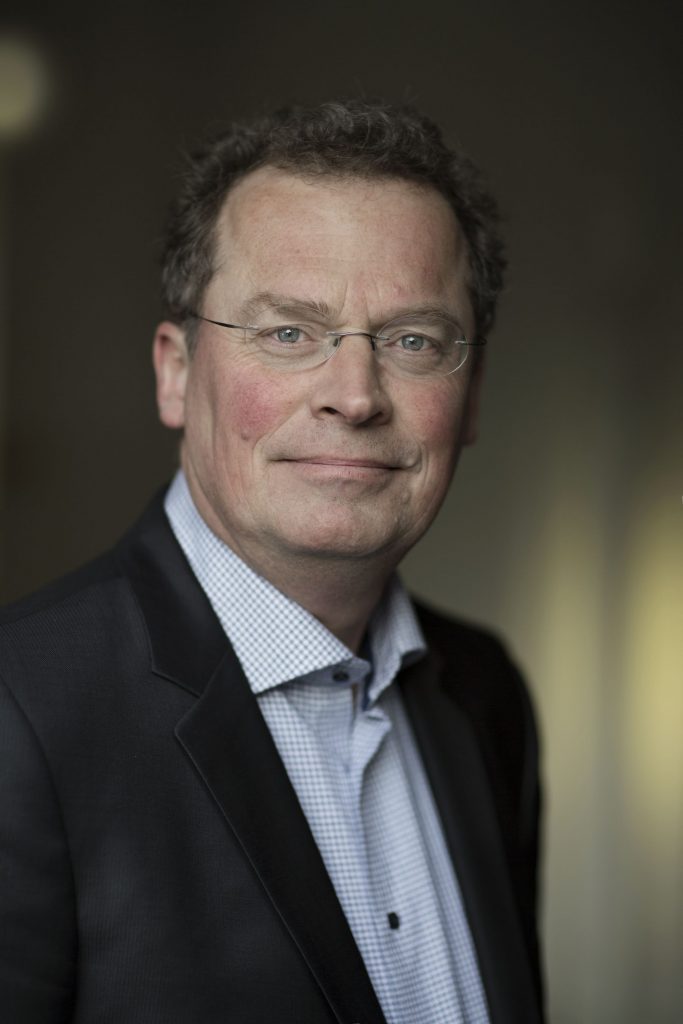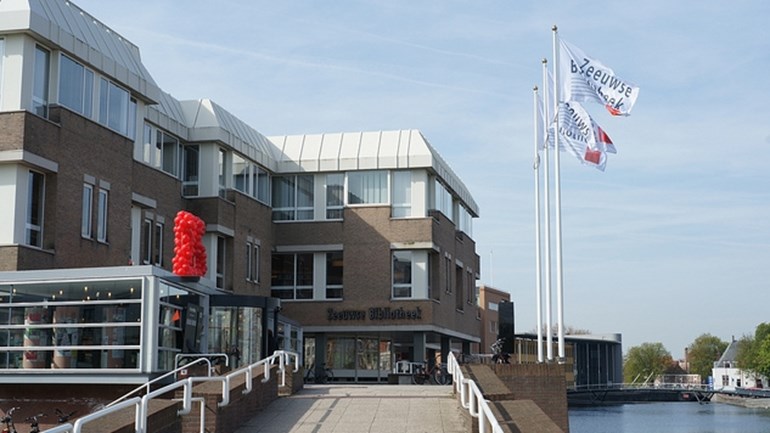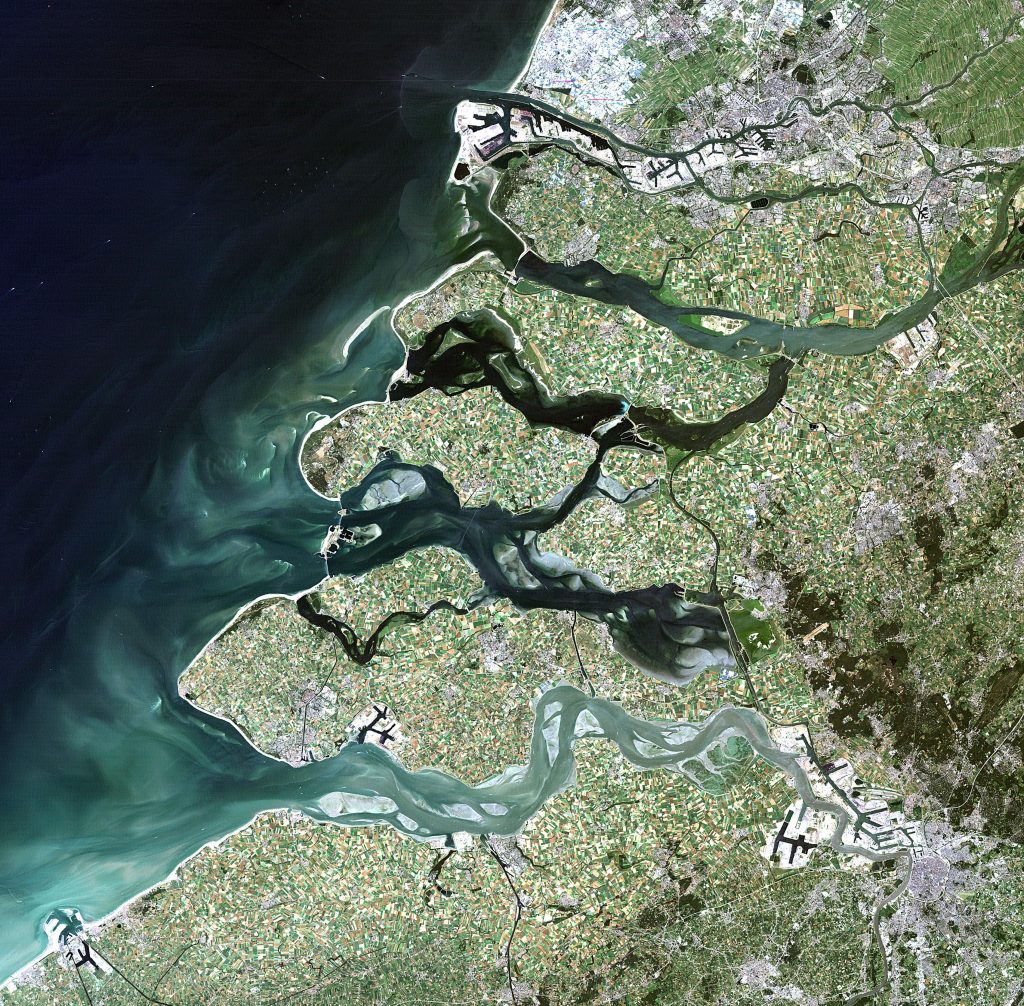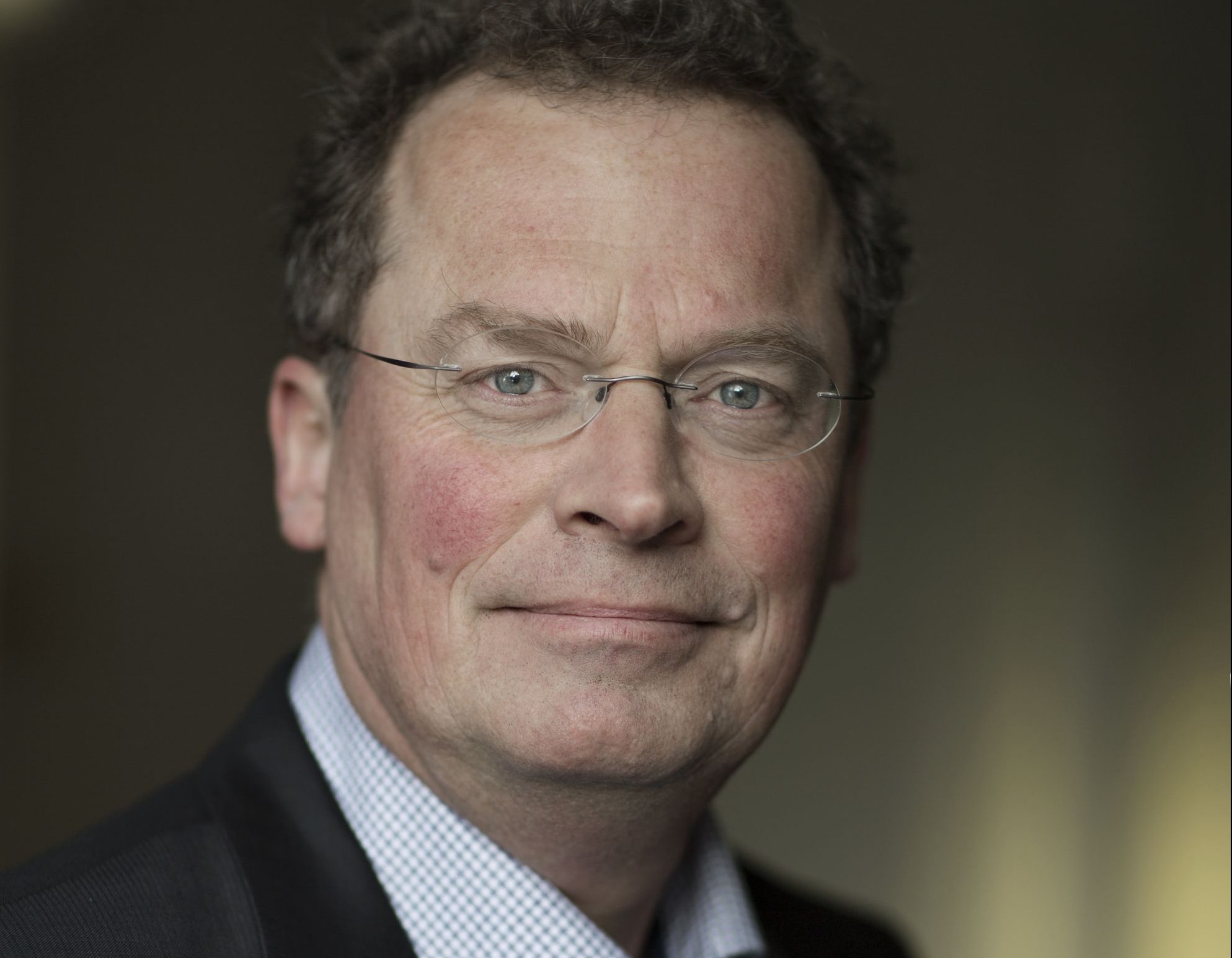By Sara Bartl and Joëlle Koorneef
You sent in your questions and we sat down with the Dean to get them answered! This is only the first part of the interview, so stay tuned for the second one in the upcoming Tabula Rasa Print Edition. And enjoy!
You are very visible and approachable as a Dean, both online as well as in the physical world. Is this a conscious decision from your position as Dean or does it come natural to engage with students in this way?
Both. I am not a social animal. Rather I am kind of a romantic loner in many ways. But I find people immensely fascinating, and there are a lot of immensely fascinating people at this college. I like to talk to people and I like to meet people as people, as individuals. So, if that is called being approachable, or if that is part of being approachable, that is because I am open for people who will come up to me and I actually like that a lot. If a student would ever be hesitant to come up to me about something – it could be anything – they shouldn’t, because I like that. Even though sometimes I can come across as kind of a grumpy type, who is not that easily approachable, I am not, I think.

Is that also the reason why you made a Facebook-account?
I never did Facebook before, I have to admit that. I have been a Director of Education before at philosophy at Utrecht, I have been a Vice Dean at that faculty, I was responsible for 35 programs with 6000 or 7000 students and you ask yourself: how can I ever know what they are experiencing? This is a relatively small community of 575 or 600 students. And it may seem easy to reach these students, but again, it is not. So, I organized these public sphere events and you end up reaching the same kind of students: the board members, who are in the representative board, in the council, in the program committee. And that’s fun, and they are great students, they are very engaged and they know everything and they are wonderful to work with. But I still walk the streets of Middelburg and see someone, and usually you know that must be a UCR-person, that must be a student. But you don’t reach them. And I thought: I will be on Facebook. Because it’s a different way of reaching people. I have to say that I am not particularly crazy about it. I do like it, I see particular advantages to it. I come across the Roosevelt Confessions, which I find, well, sometimes funny but often worrying. It is a world that is not my natural world. It doesn’t come easy to me, but it’s fine! And yes, I do want to be on Facebook to be visible.
How do you spend your free time at UCR?
Well, Facebook. Sometimes, I go through my photo books there. I am very much interested in landscape photography and not the sunset kind of landscape photography, but the kind of landscape photography that is interested in how human beings use landscapes, the spaces they create and the spaces that they close off. In using the landscape, we in a way say you can be here and you cannot be there. Or you may be here and if you want to go there that’s how you go. I find that endlessly fascinating. I have a large collection, this is just a part. If I want to get away from everything I have to get out a book like that. I look at it for ten minutes and then I’m free to go. Sometimes I will just go for a walk or to the library.

To the Zeeuwse library? Or the Archive?
Well the archive is too close by. When I want to write for instance, whether it’s in my research or something I have to do as a Dean, I grab my laptop and I walk to the library. I will sit there for a couple of hours and it’s wonderful. Then I’m away. I’m a great lover of libraries and I actually like the Zeeuwse library, it’s a good place.
Sometimes I think I should chat more, just for these ten minutes. There are those people who are good at small talk, but I’m not incredibly good at that.
Yeah, it’s hard.
Yes, maybe it’s hard for you too, but there are some people to whom it comes very easily. So I don’t know if that was an answer, but that’s what I do. And I’ll grab a tea or a coffee, but who doesn’t.
Many other UC’s center around specific “themes”. You’ve got LUC, which has international relations and UCT with technology/engineering. UCR has long had an arts and humanities focus. Look at the arts and design and music track that we try to put forth. The Strategic Plan however, seems to prioritise the sciences both financially and ideologically. Why is UCR not focusing on developing existing resources (instructors, tracks, fixing campus locations) that are already there instead of establishing new ones?
Interesting. There is nothing in me that wants to get rid of an arts and humanities focus. I really like that music program that we have, I like the arts and design. I am a humanities person, I am kind of on the border between humanities and social sciences and political sciences. I love the humanities and I love what has been done there and we have all we need in order to be really good at that. We have fantastic professors and instructors in these areas and we have a great music room, we have an arts and design practice space, we can do that. We have very good people in the science department, but I think that the science department and applied aspects of that and engineering aspects of that can be made stronger.
We need much better lab spaces here if we want to keep up with the best when it comes to the sciences. I am very proud of the fact that in the first year of my deanship we succeeded, in cooperation with the Province and the city and the University of Applied Sciences, to get a plan accepted for a joint research centre that will be built most probably behind this big building that they are renovating now opposite Koestraat. It’s called Groenewoud. The idea is to build a lab centre building and that will be shared by the University of Applied Sciences and us. We will have our own wing in it. And we really need that for the sciences, because the lab space that we now have in Vlissingen at the University of Applied Sciences is very basic, and it is good enough, but we need more if we want to keep up. So, there was an opportunity there. I think we need to jump on that wagon in order to keep innovating here.

Source: ESA Earth Online
Zeeland is, as a landscape – there is my landscape again – and as a social delta, both as a physical and a social delta, a very interesting place to study. Even more so than it has been before. High technological solutions to problems of the interaction of nature with culture, society in nature, have been developed here. Think of the waterworks, they are world-renowned. That defines this region and this college does relatively little with that. So, if you think about a theme that we are missing here, even though we are right in that place where all that happens: I think there you have one. You can tie it to questions of sustainability, of sea level changes – everyone says sea levels rise but it may actually go down, we don’t know really what will happen – that is the kind of stuff you can study here. Of course, Delft is the world centre for that here in North-Western Europe, and we cannot compete with that. But we are located here right in the middle of it. And we want, and we are able to, bring such a focus to our college and not have it be just technological, but something that can be truly interdisciplinary.
Because this is basically about water, energy, sustainability and bio-based solutions to dealing with questions of sustainability. They are never purely technological. There are always social and political questions. So, you need sociology, anthropology, political theory and political science. There are all kinds of ethical problems, so you need philosophy, normative reasoning and arts and humanities. I think that is a huge chance there for us. So, are there going to be investments on the sciences side of the college? Yes, there are. In two steps. So first we build this facility that will really dramatically increase the quality of labs at the college. But this will not be simply the strengthening of that side of the college. It will be the strengthening of a liberal arts and sciences college, and we can really do something there. So I want to do that, not at the cost of what we have, but as something that can strengthen what we have. Because I think that all departments will benefit from the fact that we can build on the sciences side of the college.
You talk about instructors, and if you talk about tracks there is kind of a systemic issue in the college. We have a lot of very good instructors and we have a lot of very interesting tracks. If there is a weakness there, that is because they are so well defined, the tracks, and the expertise of the instructors is so well defined. We sometimes, I think, do not really live up to the possibility of crossing borders… Of working across the borders of tracks as much as we could, in a multi-disciplinary and interdisciplinary way. And that is actually where the real innovations and the really exciting stuff that goes on in academia happens. I am not saying we are bad at that, because we aren’t. There is a lot of interesting stuff here that has that kind of characteristic, but we could do more like that. Be a bit more wild, actually, yeah? To boldly go where no woman or man has gone before.
I expect this focus on engineering and innovation to act as a motor, not just for the sciences part of the college, but actually for the whole of the college. You know, think of arts and design. Engineering and design in many ways are about the same thing, it’s about making things. It’s about designing for the world. And design is not just about the beauty side of aesthetics and engineering is not just about, let’s say, the technical side of making things. They are the same in many ways. If you look at engineering schools across the world you see they are flying in arts and humanities professors who can look at technical questions in new ways. They get in philosophers and social theorists. There are all these social aspects that are important when you want to build something. The whole question ‘why would you want to build something?’ almost always has kind of a social answer behind it. And that is the kind of integration that I think fits perfectly within the whole idea of liberal arts and sciences. That’s what we are building. The Strategic Plan is a Strategic Plan. The Strategic Plan will not talk as much about what we have and what is solid, as what we do not yet have, because it is about a strategic vision. But this integration of it all is really the motor behind it.
That was a really good answer and I think really necessary because of course the Strategic Plan does not talk about the why’s behind the reasoning. Why do we need this vision? I think this is going to be very good for students.
I hope it helps. Actually, we will have a public sphere event about this. It will be about this engineering and innovation thing and it will have an information side, so professor Rijkers and I will give you all a lot of information about what this is about, and we will talk about these two steps. On one hand, there is this building, this joint research centre, and on the other hand there is the idea that we could go further than that, but that depends on finances that we may or may not get from the Province and the city, which would enable us to really hire new instructors and professors in these further fields so that could work towards an extra department. But that is really something that can only become a reality at a point that you two are already past your masters.
Is UCR ready for the drastic changes proposed in the Strategic Plan?
That’s a very important question. Changes in successful institutions have to be gradual if you want to make them work. UCR is a highly successful institution and at the same time it is an institution that has remained the same for quite a long while. I think it is in need of a bit of innovation. And an extra department of engineering and innovation is a big step. But we will not, repeat not, just do that overnight. We will first have this building with much better facilities. We will attract, if we have the funding and only if we have the funding, new expertise, to start working in a couple of new fields, like applied physics and geophysics or digital imaging. People working on questions of the oceans, of the sea, the sustainability side, many things are thinkable. But I am convinced that you should not do that too quickly, because UCR is a successful institution and you can break up a successful institution if you change it too rapidly.
I can understand that people would be worried about that. We will only take such far going steps if we are as certain as can be that it will make the whole place stronger. And it will never be done at the expense of the social sciences, the arts and humanities and the pure sciences. There are all kinds of people who of course want this city to go ahead, so they will talk about a second college, a technical university, I don’t know what. And actually when I came in here, there was this whole plan for a second college and I actually saw that as a threat to UCR. So what I did with Dr. Snijders, together we were invited by the province to have dinner on the boulevard in Vlissingen and talk about this. I was new, they wanted to know: Who is this guy? Can we manipulate him? I said it’s an interesting idea but you shouldn’t make a second college, because you may end up with two colleges that are not strong enough. And in the end you will have nothing.
What you may want to do, is, very gradually see, if the successful college you have could actually be strengthened and have maybe a more distinctive identity in the future, because you would enable it to make more of many of the questions about the delta that we are in, the border area that we are in which is quite industrial. That would make the college and the province stronger because it would make it more attractive having an intellectual culture around these themes which are important for the area. And we will be talking about that during the Public Sphere with you. I understand all the worries that are behind these questions, but we also have to see the opportunities. This is also a way to make local provincial and national government enthusiastic about investing. And finding means to invest in innovations is crucial, even for very successful institutions. Very good questions, and I really like that I have the opportunity to respond, because of course I do so in the council and I do so when I talk to the program advisor committee, but that are two or three students so this is really great.
Do you want to get even more information on innovations concerning lab facilities and a potential new engineering track? Do you want to be part of the discussion around it? Make sure to attend the Public Sphere event on Monday, the 27th at 18:15. Sign up by sending an e-mail to [email protected]
Sara Bartl, Class of 2019, is Linguistics & Antiquity major from Salzburg, Austria.
Joëlle Koorneef, Class of 2018, is a Literature & Antiquity major from Zwijndrecht, the Netherlands.

